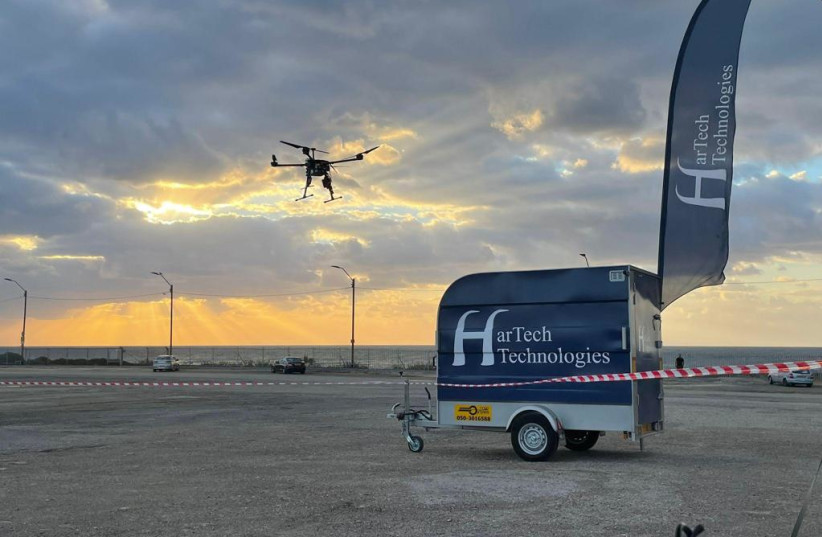Israel’s national drone initiative is entering the fourth phase of its pilot program, having begun a two-week series of flights over Gush Dan and Yeroham in order to “integrate the use of drones in routine activities such as transportation of basic products, first aid; deploying a drone attached to a vehicle for real-time monitoring of traffic movement with AI-based elements that can provide forecasts, and much more,” according to an official statement.
The initiative was established with the goal of advancing the deployment of drones for the public benefit, in order to assist in reducing congestion on roads and to establish a national network of airways that are managed for the purposes of transporting medicines, vaccines, tests and medical equipment, retail market shipments, and more.
“In the framework of the fourth phase of this pilot program, the drone initiative is taking one step forward with additional missions and challenges, and expanding the operational envelope and the potential civilian uses of drone technology,” said CEO Israel Innovation Authority Dror Bin.
“This is another significant milestone, in which all of the partners in both public and private sectors are establishing an innovative model for drone manufacturers and operators, as well as the Israeli public.
“This kind of cooperation is a catalyst for additional entities, such as rescue services and local authorities, as well as other commercial entities, to undertake and to experience the capabilities and potential that is latent within and demonstrated by this trial.”

Eyal Bilia, Ayalon Highways acting vice president of technology and innovation, spoke to the potential use cases of the drone fleet:
“The National Drone Initiative is part of a project to deal with traffic congestion on the roads.
“First, by proving the ability of the drones’ operational system to monitor events and to analyze traffic congestion from Ayalon Highways’ Gush Dan Metropolitan Traffic Management Center at Savidor.
“And second, by proving its ability to assist in the delivery of small goods in city centers through paving virtual lanes for drones.”
According to Bilia, 20% of congestion problems in city centers stem from the movement of small goods; the use of drones can potentially alleviate that congestion, by bringing those deliveries to the air.
“The Civil Aviation Authority is adjusting these large pilot testings in accordance with the future legislative outline, and in so doing is preparing and ‘ripening’ the Israeli market – both so that Israel will be ready for urban drone deliveries, and that drone companies will be able to move forward in the international market, without compromising on the requirements for safe operation for the public and the manned aviation field,” said Joel Feldschuh, director of the Civil Aviation Authority. “The fourth phase of this pilot takes another step in examining future control architecture in the domain of urban deliveries via drones.”
The fourth phase of the pilot program includes several drone companies: Airwayz Drones Ltd., Wonder Robotics Ltd., Blue White Robotic, Skylinx Technologies Ltd., and FlyTech Aerial Solutions Ltd.
In addition to those listed above, these drone companies also played a significant role in the program:
High-Lander Aviation Ltd, which provides autonomous solutions in the areas of Delivery, First Response, and Public Safety; and Cando Drones, which works to integrate drones in the fields of Security, Delivery, and Mapping.
